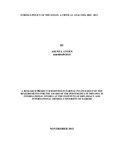| dc.contributor.author | Asunta, Ayuen | |
| dc.date.accessioned | 2013-11-25T12:07:23Z | |
| dc.date.available | 2013-11-25T12:07:23Z | |
| dc.date.issued | 2013-11 | |
| dc.identifier.citation | Postgraduate diploma in international studies at the institute of diplomacy and international studies, | en |
| dc.identifier.uri | http://erepository.uonbi.ac.ke:8080/xmlui/handle/123456789/60029 | |
| dc.description | A research project submitted in partial fulfillment of the
requirements for the award of the postgraduate diploma in
international studies at the institute of diplomacy and
international studies, university of Nairobi | en |
| dc.description.abstract | The study critically analyses the foreign policy of the Sudan from 2005 - 2012 and within the
context of the Comprehensive Peace Agreement (CPA) signed on 9 July 2005. This period is
seen as the period that fuelled and highly influenced the splitting up of Sudan into Sudan and
South Sudan. The study utilised secondary data; mainly literature review. The study argues
that the signing of the Comprehensive Peace Agreement (CPA) by the Government of Sudan
and the Sudan People’s Liberation Movement (SPLM) on 9 January 2005 represented a
major step towards ending the devastating 21-year civil war between the North and South of
the country; and that the need to maintain strategic relations between the two states to
manage the oil industry cannot be overemphasised. | en |
| dc.language.iso | en | en |
| dc.publisher | University of Nairobi | en |
| dc.title | Foreign Policy of the Sudan: a Critical Analysis, 2005 - 2012 | en |
| dc.type | Thesis | en |
| local.publisher | Institute of Diplomacy and International Studies | en |

